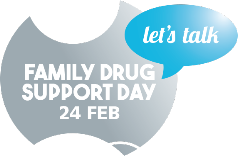CAMPAIGNER TO CALL FOR AN END TO THE ‘WAR ON DRUGS’ AT NATIONAL FAMILY DRUG SUPPORT EVENTS
Mr Trimingham will summarise the learnings from working with drug affected families through the service he founded in 1997, Family Drug Support (FDS) and present the key recommendations that instead focus on positive change and reducing harms rather than punishing people.
Mr Trimingham commented, “The Government needs to call time on this pointless war on drugs and stop wasting scarce resources by locking up the easiest targets, the end user. Drug use is a health issue not a crime issue and families want services that assist their children not punish and criminalise them.”
Mr Trimingham believes that Australia has moved from a world leader in the development of drug policies and programs to one that is led by the politics of looking tough rather than accept the evidence of what works.
Mr Trimingham will speak at the event alongside Parliamentarians, industry leaders and affected families. Events will also take place in Melbourne, Brisbane, Adelaide, Perth, Chatswood and in the regional NSW town of Narrabri. International events will also be held in Macau and the USA.
Trimingham’s FDS service receives more than 33,000 calls every year on its national hotline and runs support groups and education courses across the country for family members dealing with problematic drug and alcohol use.
Mr Trimingham commented further, “There’s a lot of presumption about what is best for families of drug dependent people but rarely are families themselves asked. We speak to thousands of families every year and we know what they need and we know the response from Government needs to evolve.”
The events coincide with Mr Trimingham’s Harm Reduction Report which will call for the following 8 evidence-based measures to combatting the affect of drugs:
- Greater access to Needle and syringe programs (NSPs)
NSPs represent a unique opportunity to improve the health and wellbeing of this group, and to provide education and referral to drug treatment programs where appropriate. NSPs also provide ways of ensuring the safe disposal of used injecting equipment. - Supervised injecting facilities
Better access to these facilities will increase public amenity by reducing the level of public drug use. The facilities provide sterile injection and related equipment, information about drugs and basic health care, treatment referrals, and access to medical staff. - Heroin Prescription Programs
Recent international research has demonstrated that among these “hard-to-treat” heroin users, the provision of pharmaceutical heroin to be injected under supervision is associated with reduced use of street drugs, and improved health and social functioning. - Naloxone Distribution
Naloxone available should be available for use by frontline workers such as needle and syringe program workers, outreach workers, drug and alcohol workers and others in the community services sector. Programs to promote peer distribution and access to naloxone should also be implemented. - Pill Testing Programs
The evidence is clear that the results of pill testing are quite profound and very positive. Many people decline to use a drug when an analysis of some danger is presented to them in a clinical manner by experts. - Medicinal Use of Cannabis
Public acceptance of medicinal cannabis has grown significantly over the past few years. When the international evidence from over 80 randomised control trials was reviewed it was determined that there was clear evidence of positive outcomes for the overwhelming majority. - Decriminalisation of the Personal Use and Possession of Drugs
The impact of draconian drug laws has been seen to create greater risks of HIV and other blood-borne viruses, higher incarceration rates and a range of other health and social problems. - Engagement and Involvement of Peer Organisations and Family
A peer-based, user-centred philosophy, means the organisation is run by and for people who use or have used illicit drugs and proactively supports people who use illicit drugs and people on drug treatment.
For too long families have been left in the cold as they are often seen as part of the problem. Families must be included as equal partners and consulted on all aspects in the development and implementation of drug policies and programs.
Established by Mr Trimingham in 1997, The Family Drug Support Service provides a 24-hour telephone support line, courses and support groups for families affected by drug and alcohol problems. The National Family Drug Support Day initiative is hoping to raise awareness of the services and the help that is needed for families, reduce the stigma and discrimination for families and people who use drugs and promote harm reduction strategies for families and friends.
Mr Trimingham concluded, “National Family Drug Support Day should become an important day in everyone’s calendar. It is in all our interests to reflect on the changes that will reduce the impact of drug and alcohol use on individuals, families and the wider society.”
For more information about the National Family Drug Support or to register visit www.nationalfdsday.fds.org.au
For requests for interview and further information:
Holly Clark
Media Liaison for FDS
0452 069 936
About the Family Drug Support Service
- Established by Tony Trimingham in 1997, Family Drug Support volunteers take around 33,000 calls to their support line every year.
- The Service provides 24/7 support (Phone: 1300 368186) and support groups in capital cities and a growing number of regional centres.
- FDS also offers the Stepping Stones course for families/friends supporting someone with drug and/or alcohol problems.
- For more information, visit the website www.fds.org.au
